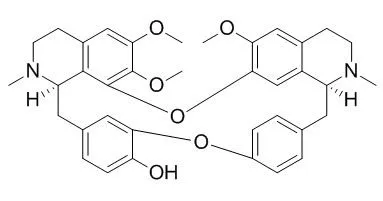| In vitro: |
| Anat Rec (Hoboken). 2014 May;297(5):802-9. | | Berbamine enhances the antineoplastic activity of gemcitabine in pancreatic cancer cells by activating transforming growth factor-β/Smad signaling.[Pubmed: 24619961] | Drug-resistance to gemcitabine chemotherapy in pancreatic cancer is still an unsolved problem. Combinations of other chemotherapy drugs with gemcitabine have been shown to increase the efficacy of gemcitabine-based treatment.
METHODS AND RESULTS:
In this study, the effect of Berbamine on the antitumor activity of gemcitabine was evaluated in human pancreatic cancer cell lines Bxpc-3 and Panc-1, and the underlying mechanisms were explored.
Our results demonstrated that Berbamine exhibited a time- and dose-dependent inhibitory effect in the pancreatic cancer cell lines. Berbamine enhanced gemcitabine-induced cell growth inhibition and apoptosis in these cells. Combined treatment of Berbamine and gemcitabine resulted in down-regulation of anti-apoptotic proteins (Bcl-2, Bcl-xL) and up-regulation of pro-apoptotic proteins (Bax, Bid). More importantly, Berbamine treatment in combination with gemcitabine activated the transforming growth factor-β/Smad (TGF-β/Smad) signaling pathway, as a result of a decrease in Smad7 and an increase in transforming growth factor-β receptor II (TβRII) expression. Changes in downstream targets of Smad7, such as up-regulation of p21 and down-regulation of c-Myc and Cyclin D1 were also observed. Therefore, Berbamine could enhance the antitumor activity of gemcitabine by inhibiting cell growth and inducing apoptosis, possibly through the regulation of the expression of apoptosis-related proteins and the activation of TGF-β/Smad signaling pathway.
CONCLUSIONS:
Our study indicates that Berbamine may be a promising candidate to be used in combination with gemcitabine for pancreatic cancer treatment. | | Circ J. 2012;76(8):1993-2002. Epub 2012 May 15. | | Berbamine protects the heart from ischemia/reperfusion injury by maintaining cytosolic Ca(2+) homeostasis and preventing calpain activation.[Pubmed: 22664727] | Berbamine, a natural compound from Barberry, was reported to protect myocardium from ischemia/reperfusion (I/R) injury, but the underlying mechanisms are largely unknown.
METHODS AND RESULTS:
Berbamine pretreatment from 10 to 100nmol/L concentration-dependently improved post-ischemic myocardial function. Similar protection was confirmed in isolated cardiomyocytes characterized by the attenuation of I/R-induced intracellular free Ca(2+) concentration ([Ca(2+)](i)) overloading and the depression of cell shortening and Ca(2+) transients, which were partially mimicked but not augmented by calpain inhibitor calpeptin and abolished by mitochondrial ATP-sensitive potassium (mitoK(ATP) channel inhibitor 5-hydroxydecanoate (5-HD) and phosphoinositide 3-kinase (PI3K) inhibitor wortmannin. Consistently, I/R-induced increase of calpain activity and decrease of sarcoplasmic reticulum Ca(2+) ATPase (SERCA2) activity; and protein expression of SERCA2a, desmin, calpastatin and Akt was significantly attenuated by Berbamine. In addition, I/R-decreased Akt protein was reversed by calpeptin. Moreover, Berbamine further increased I/R-enhanced phosphorylation of Akt and glycogen synthase kinase-3β (GSK3β). These protections were abolished by wortmannin. Furthermore, Berbamine significantly attenuated I/R-induced lactate dehydrogenase release, infarct size and contractile dysfunction, and such cardioprotective actions were abolished by wortmannin and 5-HD or mimicked by glycogen synthase kinase-3β (GSK3β) inhibitor SB216763 but without additive effect.
CONCLUSIONS:
These findings suggest that Berbamine confers cardioprotection against I/R injury by attenuating [Ca(2+)inf(i) overloading and preventing calpain activation through the activation of the PI3K-Akt-GSK3β pathway and, subsequently, opening of the mitoK(ATP) channel. |
|
| In vivo: |
| Mol Cancer Ther. 2013 Oct;12(10):2067-77. | | Berbamine inhibits the growth of liver cancer cells and cancer-initiating cells by targeting Ca2⁺/calmodulin-dependent protein kinase II.[Pubmed: 23960096 ] | Liver cancer is the third leading cause of cancer deaths worldwide but no effective treatment toward liver cancer is available so far. Therefore, there is an unmet medical need to identify novel therapies to efficiently treat liver cancer and improve the prognosis of this disease.
METHODS AND RESULTS:
Here, we report that Berbamine and one of its derivatives, bbd24, potently suppressed liver cancer cell proliferation and induced cancer cell death by targeting Ca(2+)/calmodulin-dependent protein kinase II (CAMKII). Furthermore, Berbamine inhibited the in vivo tumorigenicity of liver cancer cells in NOD/SCID mice and downregulated the self-renewal abilities of liver cancer-initiating cells. Chemical inhibition or short hairpin RNA-mediated knockdown of CAMKII recapitulated the effects of Berbamine, whereas overexpression of CAMKII promoted cancer cell proliferation and increased the resistance of liver cancer cells to Berbamine treatments. Western blot analyses of human liver cancer specimens showed that CAMKII was hyperphosphorylated in liver tumors compared with the paired peritumor tissues, which supports a role of CAMKII in promoting human liver cancer progression and the potential clinical use of Berbamine for liver cancer therapies.
CONCLUSIONS:
Our data suggest that Berbamine and its derivatives are promising agents to suppress liver cancer growth by targeting CAMKII. |
|






 Cell. 2018 Jan 11;172(1-2):249-261.e12. doi: 10.1016/j.cell.2017.12.019.IF=36.216(2019)
Cell. 2018 Jan 11;172(1-2):249-261.e12. doi: 10.1016/j.cell.2017.12.019.IF=36.216(2019) Cell Metab. 2020 Mar 3;31(3):534-548.e5. doi: 10.1016/j.cmet.2020.01.002.IF=22.415(2019)
Cell Metab. 2020 Mar 3;31(3):534-548.e5. doi: 10.1016/j.cmet.2020.01.002.IF=22.415(2019) Mol Cell. 2017 Nov 16;68(4):673-685.e6. doi: 10.1016/j.molcel.2017.10.022.IF=14.548(2019)
Mol Cell. 2017 Nov 16;68(4):673-685.e6. doi: 10.1016/j.molcel.2017.10.022.IF=14.548(2019)